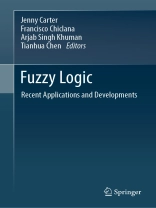Since its inception, fuzzy logic has attracted an incredible amount of interest, and this interest continues to grow at an exponential rate. As such, scientists, researchers, educators and practitioners of fuzzy logic continue to expand on the applicability of what and how fuzzy can be utilised in the real-world. In this book, the authors present key application areas where fuzzy has had significant success. The chapters cover a plethora of application domains, proving credence to the versatility and robustness of a fuzzy approach.
A better understanding of fuzzy will ultimately allow for a better appreciation of fuzzy. This book provides the reader with a varied range of examples to illustrate what fuzzy logic can be capable of and how it can be applied. The text will be ideal for individuals new to the notion of fuzzy, as well as for early career academics who wish to further expand on their knowledge of fuzzy applications. The book is also suitable as a supporting text for advanced undergraduate and graduate-level modules on fuzzy logic, soft computing, and applications of AI.Table of Content
Chapter 1. Recognising Handwritten Digits Using a Fuzzy Neural Network.- Chapter 2. Fuzzy Assessment of Student Academic Performances.- Chapter 3. A Hybrid Fuzzy Neural Network for Image Recognition.- Chapter 4. A Fuzzy Diagnostic System for Heart Disease.- Chapter 5. Analysing Medical Notes using Fuzzy Logic.- Chapter 6. Fostering Positive Personalisation through Fuzzy Clustering.- Chapter 7. Fuzzy Logic in Modern Information Retrieval.- Chapter 8. Fuzzy Applied to Sentiment Analysis.- Chapter 9. Fuzzy Logic, a Logicians Perspective.- Chapter 10. Applications of Fuzzy Logic in an Automated Warehouse.- Chapter 11. Can Fuzzy Systems Assist with Project Planning?.- Chapter 12. Fuzzy Logic in Autonomous Vehicles.- Chapter 13. AI Spawning Fuzzy Logic Fuzzy Inference System.- Chapter 14. The Application of Fuzzy Logic on Intelligent Transportation Systems.- Chapter 15. Fuzzy Logic Applied to Water Processes.- Chapter 16. Applications of Fuzzy Logic in Autonomous Vehicles.- Chapter 17. Predicting Cyber Threats using Fuzzy Logic.- Chapter 18. Implementations of Fuzzy Logic in Camera Systems.- Chapter 19. Application of a Fuzzy Logic Control System for Stock Market Prediction Based on Technical Indicators and Fundamental Analysis.- Chapter 20. The Application of Fuzzy Logic in Determining Outcomes of Sporting Events.- Chapter 21. Using Fuzzy Logic to Educate People on Phishing.
About the author
Dr. Jenny Carter is a Senior Lecturer in the Department of Computer Science at the University of Huddersfield, UK. Her other publications include the Springer titles Transnational Higher Education in Computing Courses: Experiences and Reflections and Higher Education Computer Science: A Manual of Practical Approaches.
Dr. Tianhua Chen received his B.Sc. in software engineering from Fujian Normal University, China, in 2012 and the M.Sc. degree in intelligent systems in 2013 and the Ph.D. degree in computer science in 2017, both from Aberystwyth University, Aberystwyth, U.K. Dr. Chen is currently a Senior Lecturer in Artificial Intelligence with the Department of Computer Science, School of Computing and Engineering, University of Huddersfield, Huddersfield, U.K. His research interests lie in the realm of machine learning, computational intelligence and their applications to healthcare intelligence. He has served as a Lead Guest Editor for the special issue on Medical Analytics for Healthcare Intelligence in the Artificial Intelligence in Medicine journal.
Dr. Francisco Chiclana is a Professor of Computational Intelligence and Decision Making in the School of Computer Science and Informatics at De Montfort University, Leicester, UK.
Dr. Arjab Singh Khuman is a Senior Lecturer and Researcher at the same institution. Associated to the Institute of Artificial Intelligence, with a focal interest in uncertainty modelling and computational intelligence












